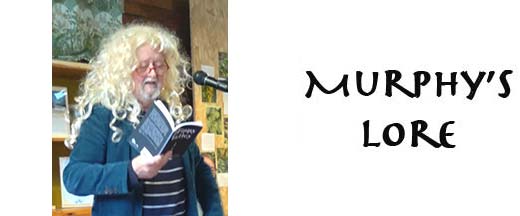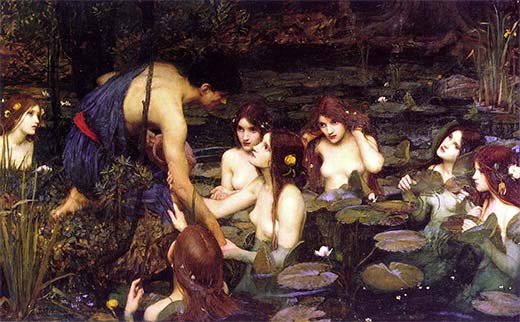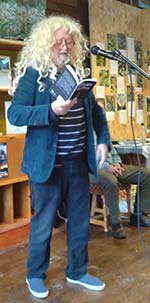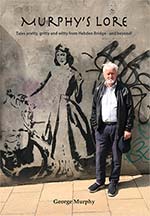
Third series, episode 36
All 128 episodes are available here on the HebWeb.
In episode 36, a Merriman makes us despair at Hebden Bridge station, but don't think of going abroad for your summer vacation, a great writer is shocked, and a goat is unfrocked, but beware Siren calls when you near Lumb Falls!
Save our ticket offices!

Our railway system contains 55 million different fares. Despite which complexity, ticket offices - and officers - are due to disappear. So I went to the demo at Hebden Bridge station to complain.
On the concourse we were greeting each other, some folding away blood red Labour banners, having realised this demo was open for all, when,
"Save our ticket offices," someone shouted, surprising us.
"Save our ticket offices!" we belatedly picked up the cue, causing the Look North camera to swing its baleful eye towards us.
An awkward silence followed.
"People not profits!" came another cry.
"People not profits!" we responded. A single response to a shout doesn't really qualify as chanting, but there was honest conviction in our voices.
For people who suddenly reckon on having a day out, ticket offices are essential to get advice on which combinations of routes they should take, and whether a ticket for one brand of train allows you to link to a different brand. But if the ticket offices are closed at your local station, and the ticket machines fail, and you climb on board a train honestly hoping to pay when the conductor comes along, will you be treated like a criminal if you're on the wrong train? As a `Dr B Ching' reveals in Private Eye, "Self-purchase makes people far more likely to buy the wrong ticket … for example, when using state owned Trans-Pennine Express with a ticket for Northern Express only." The railway companies are hoping to shed 2,000 staff from the railways, but I bet ticket inspectors won't be amongst them.
These train companies tell us that when the ticket offices go they will make sure helpful staff will attend to our needs. But I don't want to rely on helpers to show me how to use machines in railway stations. I want them to serve me. Sell me a ticket, advise me on the cheapest and best route. And make sure there are guards on the trains and at the station. Especially at night.
The proposals from the railway companies allow passengers to take part in a consultation exercise over a three week period, during which time MPs will be absent from parliament, and newspapers will enter their silly season. I expect the companies thought they would close down ticket offices without raising too much fuss. But charities have reacted with horror. Those for the blind have combined to send a letter of complaint to Railways Minister, Huw Merriman, after finding that 97 per cent of blind and partially sighted passengers felt unable to confidently book tickets online. They need a fixed point at stations where they can gain advice before purchasing a ticket.
So chant after me:
Save our ticket offices!
People before profits!
The heat is on
We've just had the hottest week in the recorded history of our planet, but this news was tucked away on the inside pages of newspapers, and certainly wasn't the opening item on the TV News. The media focus was on the private life of someone in the media.
Meanwhile, Earth burns. Except it doesn't always … When people stand in the desert in America, they boast about the records being broken! When we see tourists in Italy they just look a bit frazzled. Pictures don't always tell a thousand words. So, in so far wet and windy UK, TV News cameras are focusing on protestors doing daft stunts to spoil people's enjoyment of music and sport – and, sure throwing orange stuff around makes better pictures. Apart from offending potential supporters, the protestors help the government to deflect attention away from what the scientists are trying to tell us.
Thinking of which, I remember storyteller Ben Haggerty telling me to include one item on global warming in every performance I do from now on. Well, I've not quite managed that, Ben. But when my granddaughter called behind her, just the other day, "Get a move on old man!" I recalled I'd once written this song …
My daughter's darling daughter
Vikings, Normans, such as these,
Came to these islands as newcomers,
These verdant lands in pewter seas
Shone emerald bright in rainbow summers.
With birds tumultuous in the trees
And fish abundant in clear water.
And I would like to leave you these,
My daughter's darling daughter.
Chorus:
But it's late old man,
It's too late,
Smell the smoke from the redwood trees.
And it's late old man,
It's too late,
Hear the ice crash in the Arctic seas.
With bare foot print on jewelled grass,
When days are long and nights are shorter,
Be sure these precious hours to grasp,
My daughter's darling daughter.
(Chorus)
With valley cleared of poison air,
And moorland freed from rich men's slaughter,
I close my eyes and see you there,
My daughter's darling daughter.(Chorus)*
[Mmm .. might need a middle eight in there, I'll just see what granny thinks …]
Ouch!

Monty Don News
Ledbury's a lovely town, and at its Poetry Festival, Monty Don the famous gardener, chose garden poems by ten famous writers: Marvell, Tennyson, Elizabeth Barrett Browning, WH Auden, WS Graham, TS Eliot, Seamus Heaney, Ted Hughes to read, and completed his `first eleven', by reading a poem from our own Zaffar Kunial, from his latest collection, England's Green (2022, Faber).*
Hawthorn
I like it when memories aren't pinned
haughtily to words, but come to find
them, slowly on the bridge
of a warm breeze filled emptily
with blackbird songs, a robin
twisting its invisible screw
and a more piercing song
I can't yet name, and beside it a scent
that belongs at the slow start
of another summer, alive
and pungent and unattached
then off to the off-white flowers
a little distance off from this bench
and the name, the name.
*Zaffar was one of the winners of last year's Wyndham Campbell prize, and was short listed for this year's T.S. Eliot award.
Smithery
In The HebWeb Interview, photographer Andrew Smith shared his close ups of the young Keir Starmer which appeared on the front pages after he became Labour leader. But I remembered another image that appeared in Piers Morgan's interview, and showed Keir together with his flatmates.

So, I sent him some follow up questions …
Q: Which one was your girlfriend?
A: The one with the hat.
Q: What did she study?
A: Zoology. We collected hover flies together …
The town hall and tennis
On Sunday, I dragged myself away from watching the men's final at Wimbledon, to go to the poetry reading at the Town Hall. PW had promised to send me the match result, and as I reached the corner of the Square, I checked my phone and three grinning icons appeared.
Watching Alcaraz that day, I was reminded of Lionel Messi when he first appeared on our screens. At one point I swear he dummied the crowd as well as his opponent. At the Town Hall, I told Zaffar he was lucky the match was over just in time for his reading. Sure enough, just then, the poetry and tennis lovers streamed inside.
The event was introduced by Amanda Dalton, who also read from her latest collection, including poems written after her husband's death during lockdown. Auden once gave a rough rule of thumb for the difference between poetry and prose, stating that poems are about ourselves and prose is about others. And here, Amanda Dalton responded to grief and wrote about the healing balm of nature.
In the Q&A following Zaffar Kunial's reading, he said he didn't write first lines, but worked out his words in his head before committing them to his laptop. Come to think of it, he was sitting with his laptop in Squeeze, considering what to write about Simon Armitage, who was coming to the Ted Hughes Festival, when my friend up from London asked me what I thought about the soon to be Poet Laureate and Zaffar joined in with the discussion. Fortunately, we threw out some positive comments, but not as polished and precisely pitched as Zaffar's would be, and afterwards we crossed the road to buy his first book, to find out what we'd been missing.
Shocking Sylvia
In 1970, I took a gap year off and worked at Ravenscraig Psychiatric Hospital in Greenock, Renfrewshire. Steve, my Oxford bound Leeds Grammar School friend and I, were asked by the Senior Psychiatrist whether we would like to watch a woman undergo shock treatment, saying, "It seems to work, but we're not sure how!"
We politely refused.
Back in the 60s, my father was given electric shock therapy following his separation from my mother, and he told me how much he hated the sessions, although, in due time, they seemed to help him recover. Afterwards, he moved to London and got a job as a Commissionaire at the BBC.
In The Bell Jar, Sylvia Plath based Esther's shock treatment on her own experiences back in 1953, when she was given no relaxant or anaesthetic to prevent convulsive muscle spasms.
"Dr Gordon was fitting two metal plates on either side of my head. He buckled them into place with a strap that dented my forehead, and gave me a wire to bite.
"I shut my eyes.
"There was a brief silence, like an indrawn breath.
"Then something bent down and took hold of me and shook me like the end of the world. Whee-ee-ee-ee, it shrilled, through an air crackling with blue light, and with each flash a great jolt drubbed me till I thought my bones would break and sap fly out of me like a split plant.
"I wondered what a terrible thing it was I had done."
In the 1950s, women's discharge from mental hospitals often depended on their willingness to resume their role as wives and mothers. Women suffering depression were described as suffering from 'nervous exhaustion' or 'anxiety and nervous tension.'
Why the sirens stopped singing

As recently performed at the Sowerby Bridge Puzzle Writers open floor in Sowerby Bridge. Barge owner Hayley the MC brought along a poster of the famous John William Waterhouse painting, which had inspired her response to the theme of Sirens. 50 years ago, my girlfriend Rona had adhered the same poster image to her wardrobe at college. So I'd had some time to think of my own response.

Fishing for nymphs!
A mini opera performed by burlesque artistes, wild swimmers, and brass band performers (or a monologue performer with a wig).
NARRATOR:
This story recalls when nymphs at Lumb Falls, with their siren song, could ignite passions strong. Nymphs loved young men if they could catch 'um. Then they loved them again, then despatched 'um. These rum goings on seem properer set to classical music and opera.
[Band strikes up The Blue Danube]
"Our beauty is rare,
Come in! Come in!
And we're very bare,
Come in! Come in!
Oh, don't be afraid,
Come in! Come in!
No we're not mermaids,
Come in! Come in!
Your passion won't fail,
Come in! Come in!
We've not got fish tails!
Come in! Come in!
And then we will go, with the flow,
And we'll show you all we know!"
[Enter Woodsman, agog]
NARRATOR:
They got a young woodsman besotted,
And then they went for his carotid,
In a watery embrace, passion spread 'cross his face,
He wor lured, then loved, then garrotted!
[Exit Nymphs, carrying Woodsman. Enter: Poacher's wife, carrying a scroll.]
Poacher's wives lost men in addition,
And they got up a humble petition:
POACHER'S WIFE:
With their senses confounded,
Our men were all drownded,
In most compromising positions.
[Exit wife, distraught. Enter, three bachelors, meanly apparelled]
NARRATOR:
Then three bachelors, Tom, Dick and Harry,
Past their best, with no time to tarry,
Said they'd risk debauchery,
An' fast track to t' mortuary,
For a chance of a catch they could marry!
Next morning, across water skimming,
Those stout hearted lads swam wit' women.
They'd stuffed their ears full, with tar and ram's wool,
Thus preventing their senses from dimming.
[Band plays extract from Overture to The Barber of Seville. Brothers disrobe and dive into pool, essaying doggy paddles]
Splash – splash, splash-splash, splash-splash, splash!
Tom says …
I've got one, she's got a strop on,
A captivating Naiad with no top on.
She won't give in to me,
But I'll show sympathy.
Come on then lass,
For thee and me wor meant to be!'
Splash-splash, splash-splash, splash-splash, splash!
NARRATOR:
Then Dick his brother,
Had grabbed another,
Her beauty wor quite equal to that other,
And with a mighty yank,
He hurled her on to t' bank,
An' said, `I'll be your soul mate and your lover!
Splash-splash, splash-splash, splash-splash, splash!
Then t' youngest brother,
Grabbed hold o't mother!
But she wor different challenge he'd discover.
For she wor much too strong,
An' she kneed him in t thong!
An swam away before he could recover …
And so, thanks to t' plans they had hatched,
Two o't brothers wor matched,
But young Harry would say,
`Biggest catch got away!'
Crying, `Infamy! Infamy!
[Moves to centre stage]
I've not got a nymph for me!
[Harry runs from stage. Following action shown by shadows behind screen]
And one morning,
When out for a ride,
Dick's Nymph jumped in a cesspit,
[Plunk!]
And died …
[Narrator signals for sobs from audience]
And Dick in his hurry,
Fell into t' same slurry …
[Plunk!]
And they were interred …
Side by side.
[Wipes away tear]
From water Tom kept his nymph away,
For requisite year and a day.
An' their offspring, day tripping,
All love skinny dipping,
A tradition that last till this day.
[Narrator swims offstage. Band strikes up. Performers return to take bow, accompanied by Band]
Next time:
Writing from the brilliant Gaia Holmes, and drawing too - in tandem with Winston Plowes. *See The HebWeb Interview with Winston, featuring Gaia.
Murphy's Lore, the book, is available to order here
If you would like to send a message about this piece or suggest ideas, email George Murphy
More Murphy's Lore
See the Murphy's Lore home page for all 128 episodes.


